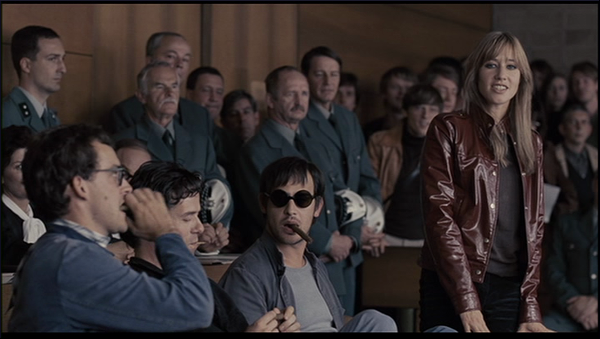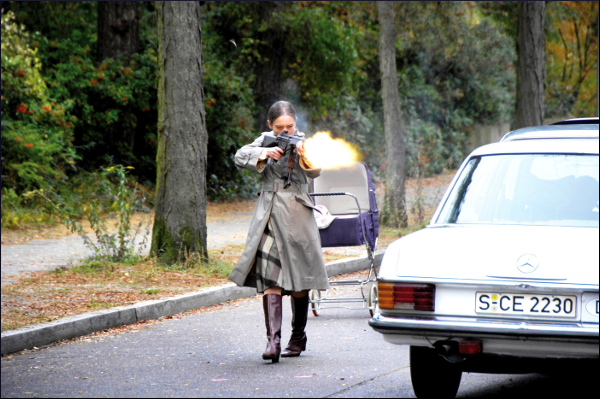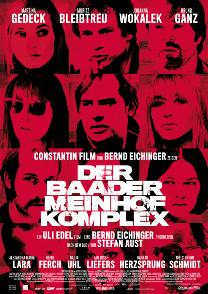The Baader-Meinhof Complex, written and produced by the late German production titan Bernd Eichinger, chronicles the rise of the Red Army Faction (RAF), a notorious terrorist group that carried out numerous ideologically motivated attacks in West Germany. Their activities stretch out across three decades, which is why their history is usually divided up into three chapters, referred to as the first (1960s), second (1970s), and third (1980s and 1990s) generations. This 2008 film focuses on the group’s inception and its first generation, following its founding members, the planning and execution of their first attacks, their subsequent incarceration, and, finally, the transition into the second generation.
"The founding RAF members can be seen as the guilty children of the Nazi regime, who are disillusioned with the idea of Germany as a country since, as they say, 'our parents were Nazis'.”
In 1967, in West Berlin, during a demonstration against the official visit of the Iranian Shah, one of the protesters, a university student, is shot and killed by the police. His death sparks the radicalization of organized socialist movements throughout the country. When the leader of one of these movements, Rudi Dutschke, barely survives an assassination attempt during a public speech at his university, a group of friends decides to take their dissatisfaction with their home country’s capitalist tendencies a step further: setting fire to two supermarkets in West Berlin. The attack is successful without causing any human casualties or injures, and the people responsible for it, Gudrun Enslin, Andreas Baader, and Thorwald Proll, are sentenced to three years in prison. During the court proceedings, they are interviewed by left-wing journalist Ulrike Meinhof, who will soon go on to become one of the most notorious members of the soon-to-be-founded RAF.

Much like Olivier Assayas’ Carlos, which follows legendary international left-wing terrorist Carlos the Jackal, Baader-Meinhof is narrated soberly. The camera documents and intrudes upon the action, getting uncomfortably close to it, yet without aiming to judge those involved. We observe the group’s steady radicalization, as an enthusiastic cadre of revolutionaries, who have no intention of causing bodily harm, plan wondrous prison escapes, hide and resurface, undergo military training under the supervision of the Palestinian Fatah, carry out attacks and are eventually convicted, and, finally, spawn a second generation of followers whose methods of intimidation and ideas of revenge do nothing to limit casualties.
The sets are built with meticulous regard to historical facts: everything from the license plates on the cars to the number of shots fired and the books in Meinhof’s prison cell is based on research and obsessive attention to detail. The founding RAF members can be seen as the guilty children of the Nazi regime, who are disillusioned with the idea of Germany as a country since, as they say, “our parents were Nazis.” This is discernible in the psychology of Baader and his comrades, who, for example, repeatedly call the judge presiding over their trial a “fascist asshole.” The members of the group mix wild and profane colloquialisms with political platitudes to talk about their plans. They repeatedly refer to state officials, or to the obscure face of the state they are fighting, by using profanities such as “ diese Wichser ,” which literally translates as “those wankers,” though it’s more offensive in German than its literal British translation.
Baader’s language is concise and pragmatic, mirroring all the characteristics of a young revolutionary with aspirations to martyrdom. Some of his to-the-point comments include “ Nur die Knarre löst die Starre ” (“Only the gun can solve/loosen the stiffness,” which rhymes in German) or “ Jetzt ist Krieg ” (It's a war now), which he simply announces after learning of the death of a fellow RAF member. Meinhof is a more curious character, who undergoes a fascinating transformation from an employed and well-to-do journalist to a radical ideologue for her cause.
"Reserving moral judgment in favor of unaffected and yet engaging narration, Eichinger and director Uli Edel manage to create an informative history lesson with an all-star cast."
The evolution of the group’s radicalism is paralleled by Meinhof’s changing language. After the aforementioned police shooting of a university student during a demonstration, in 1967, Meinhof comments on the radio, “ Polizei- und Presseterror erreichten am 2. Juni ihren Höhepunkt. Da begriffen wir, dass Freiheit in diesem Staat die Freiheit mit dem Polizeiknüppel ist [...]" ( The terror of police and press has reached its climax on July 2nd. It was then that we understood that freedom in this country means the freedom for the police club [...]") A few years later, after being criticized for using gun violence during one of the RAF’s first attacks, Meinhof again speaks on the radio, now using a slightly different rhetoric, famously commenting, “ Wir sagen natürlich, die Bullen sind Schweine. Wir sagen, der Typ in Uniform ist ein Schwein, kein Mensch. Und so haben wir uns mit ihnen auseinanderzusetzen. Das heißt, wir haben nicht mit ihm zu reden, und es ist falsch, überhaupt mit diesen Leuten zu reden. Und natürlich kann geschossen warden ” (Of course we are saying that cops are pigs. We are saying, the guy in uniform is a pig, not a human being. And that's the way we have to deal with them. That means, we should not be talking to him, and it is wrong to talk to these people at all. And of course shooting is admissible). Eventually, facing the judge at her final trial, she flat-out screams at him, “ Ich lass mich doch nicht zwingen, du Arschloch !” (I'm not gonna let your force me, you asshole!), which causes her to be barred from the court proceedings.
Reserving moral judgment in favor of unaffected and yet engaging narration, Eichinger and director Uli Edel manage to create an informative history lesson with an all-star cast. The final scene is a most powerful and haunting statement on the nature – and, with it, the danger – of well-intentioned protest organizations. Baader and Meinhof are martyrs by the film’s end, and their martyrdom inspires an all-new group of ideological youths to continue their legacy by any means necessary.





